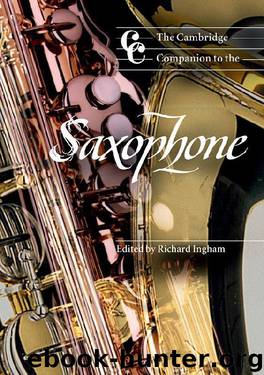The Cambridge Companion to the Saxophone (Cambridge Companions to Music) by Richard Ingham

Author:Richard Ingham [Ingham, Richard]
Language: eng
Format: epub
Publisher: Cambridge University Press
Published: 1999-02-13T02:00:00+00:00
The studio player
CHRIS ‘SNAKE’ DAVIS
A session player is a musician who is booked on a free-lance basis to work in film, television or recording studios. Almost all of us, however, combine our recording studio work with other activities such as gigs, tours, shows or teaching, and it is doubtful whether any two session sax players have matching careers. It’s a life with little or no routine – most session work comes in at very short notice, maybe a week or so if you are lucky, but all too often the request is ‘We need you now, how quickly can you get here?’ This is especially true for sax players. A producer will know they are going to need a drummer, a keyboard player and a bassist, but it’s often not until a piece is apparently finished, perhaps already being mixed, that someone says – ‘Hey, a sax solo might be really good in that bit!’
Not knowing what’s round the corner can make life exciting. One moment you are gazing at the phone wondering whether there really is a fault on the line, the next moment the phone finally does ring, and before you know it you are travelling to a top studio to play a solo for someone very famous, or flying to Tokyo to work on a live album for more money than you have ever dreamed of. The lack of routine can be disruptive, frustrating and worrying. In session work, for some reason, there always seems to be either a feast or famine. I am writing this on a flight to Belgium (all the way to Antwerp for a twelve-bar solo!), and this is the sixth flight in as many days. I have been working every day for at least twenty days, sometimes two or three jobs in one day, yet I had a couple of months in late 1996 when I hardly saw the inside of a studio.
Studio skills
Many of the skills required for session work are the same as those needed in other areas of performance – technical proficiency, a good sound, familiarity with many different styles, and of course punctuality; the ability to sight-read well is not absolutely essential, but without it the range of work available is very limited. It is more important in the studio than in other areas of performance to have well-maintained instruments. Clicks and clunks are so much more noticeable and may irritate a recording engineer to the extent that he or she may try to ‘EQ’ them out, thereby distorting your precious sound. It is possible to breeze happily through a jazz tour with a leaky tenor, not needing a soft bottom B, but in the studio you never know what to expect, and can get caught out (I was that redfaced tenor player!).
Doubling, like sight-reading, is almost a prerequisite. I play five different saxes as well as flute, alto-flute and wind synthesiser. That may seem a lot (it does by the time I’ve loaded them all into the
Download
This site does not store any files on its server. We only index and link to content provided by other sites. Please contact the content providers to delete copyright contents if any and email us, we'll remove relevant links or contents immediately.
The Goal (Off-Campus #4) by Elle Kennedy(13651)
Kathy Andrews Collection by Kathy Andrews(11812)
Diary of a Player by Brad Paisley(7557)
Assassin’s Fate by Robin Hobb(6197)
What Does This Button Do? by Bruce Dickinson(6194)
Big Little Lies by Liane Moriarty(5790)
Altered Sensations by David Pantalony(5093)
Pale Blue Dot by Carl Sagan(4996)
Sticky Fingers by Joe Hagan(4188)
The Death of the Heart by Elizabeth Bowen(3605)
The Heroin Diaries by Nikki Sixx(3543)
Beneath These Shadows by Meghan March(3298)
Confessions of a Video Vixen by Karrine Steffans(3297)
How Music Works by David Byrne(3258)
The Help by Kathryn Stockett(3139)
Jam by Jam (epub)(3071)
Harry Potter 4 - Harry Potter and The Goblet of Fire by J.K.Rowling(3057)
Computational Linguistics and Intelligent Text Processing: 20th International Conference, CICLing 2019 La Rochelle, France, April 7â13, 2019 Revised Selected Papers, Part I by Alexander Gelbukh(2978)
Strange Fascination: David Bowie: The Definitive Story by David Buckley(2857)
